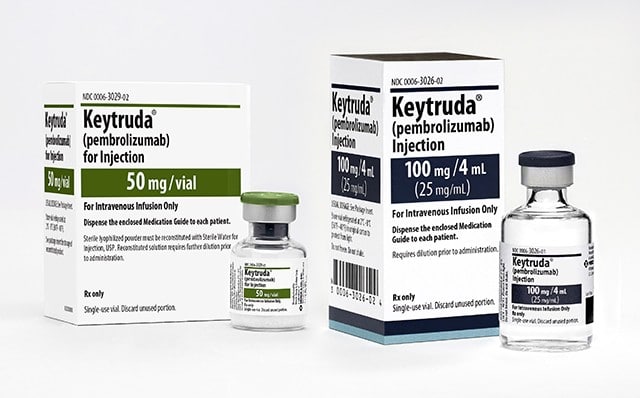Feb 2023: For stage IB (T2a 4 cm), stage II, or stage IIIA non-small cell lung cancer, the Food and Drug Administration (FDA) approved pembrolizumab (Keytruda, Merck) as adjuvant therapy after resection and platinum-based chemotherapy (NSCLC).
KEYNOTE-091 (NCT02504372), a multicenter, randomised, triple-blind, placebo-controlled trial, assessed efficacy. Patients had not undergone chemotherapy or neoadjuvant radiation. Every three weeks for up to a year, patients were randomised (1:1) to receive either pembrolizumab 200 mg or a placebo intravenously. The location of the world and adjuvant chemotherapy were stratification variables. 1010 (86%) of the 1177 randomised patients who underwent full resection also underwent adjuvant platinum-based treatment.
Disease-free survival, as determined by the investigator, was the primary effectiveness outcome measure (DFS). The trial’s primary goal was met when it showed a statistically significant increase in DFS across the board. The DFS hazard ratio was 1.25 (95% CI: 0.76, 2.05) in an exploratory subgroup analysis of the 167 patients who did not receive adjuvant treatment. The median DFS for patients who had adjuvant chemotherapy was 34.9 months in the pembrolizumab arm (95% CI: 28.6, not reached) and 58.7 months in the pembrolizumab arm (95% CI: 39.2, not reached).
Except for hypothyroidism (22%), hyperthyroidism (11%), and pneumonitis (7%), the adverse events seen in KEYNOTE-091 were mainly similar to those seen in other patients with NSCLC receiving KEYTRUDA as a single drug. There were two fatal myocarditis adverse reactions.
The suggested dose of pembrolizumab is 200 mg every three weeks or 400 mg every six weeks, up to a maximum of 12 months, or until the disease recurs or there is intolerable toxicity.
Project Orbis, an initiative of the FDA Oncology Center of Excellence, was used to carry out this review. International partners can simultaneously submit and review oncology medications using the infrastructure provided by Project Orbis. FDA worked together on this review with the Therapeutic Goods Administration (TGA) of Australia, Health Canada, and Swissmedic. At the other regulatory organizations, the application reviews are still proceeding.
View full prescribing information for Keytruda.


